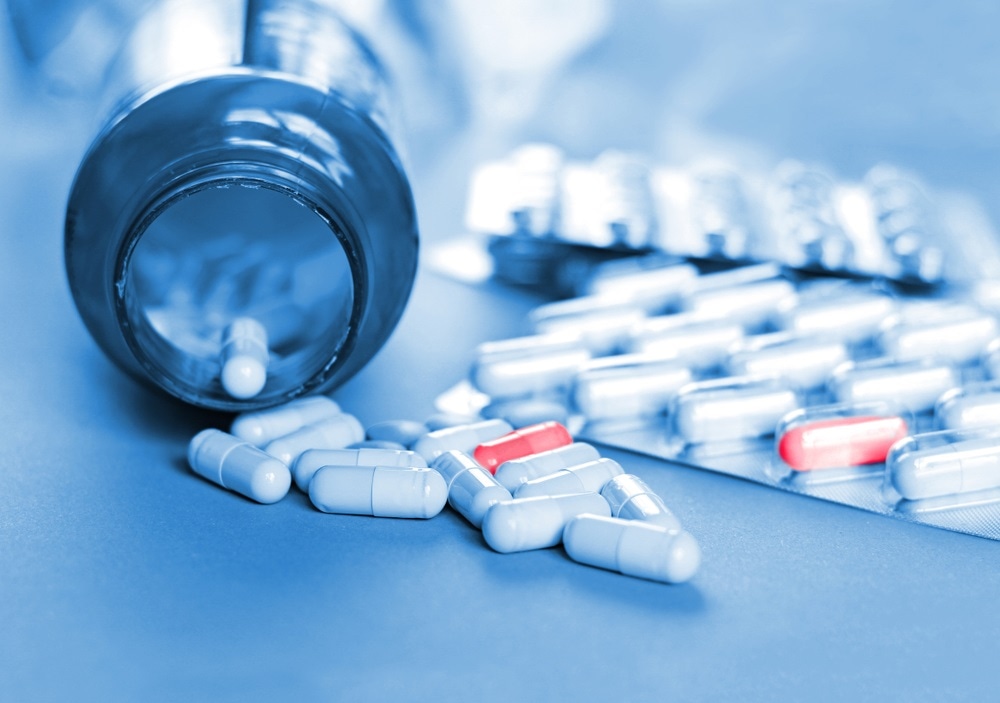Antidepressants are a type of psychiatric medication used to treat mental health disorders such as clinical depression, obsessive-compulsive disorder (OCD), generalized anxiety disorder (GAD), or post-traumatic stress disorder (PTSD). Some types of antidepressants can also be used to treat chronic pain.
Although antidepressants are a commonly used medication, their exact mechanisms are not fully understood. It is thought that they improve low mood by increasing the amount of neurotransmitter (chemical messengers such as serotonin or noradrenaline) in the brain.
 Image Credits: kubicka / Shutterstock.com
Image Credits: kubicka / Shutterstock.com
What are the different types of antidepressants?
There are a range of antidepressants that all work in slightly different ways. Some people may find greater benefit from one type of antidepressant over another, and some people find that talking therapies such as counseling or cognitive-behavioral therapy (CBT) work better than psychiatric medications. Talk therapy and types of talk therapy may be more effective for some, as they address the root causes and contributors to these conditions, such as relationship problems, money worries, or problems at work.
Selective serotonin reuptake inhibitors (SSRIs)
Many patients prefer SSRIs because they have few side effects. They are also safer from the perspective of health care providers, as someone who is suicidal is less able to seriously harm himself or herself with an overdose of these medications.
SSRIs work by blocking the reuptake (or reabsorption) of serotonin, a neurotransmitter (a messenger chemical) that is thought to lift the mood, improve sleep, and balance emotions. After sending messages through the brain, serotonin is usually reabsorbed by the nerve cells.
By blocking serotonin reabsorption, serotonin remains available in the brain to send more messages to nerve cells, thereby increasing the amount of serotonin activity in the brain and leading to elevated mood.
SSRIs are not used only for depression, but also for OCD, GAD, PTSD, and panic disorders. They can even help treat those with phobias or bulimia, a mental health condition and eating disorder in which people make themselves vomit to avoid weight gain. SSRIs can also be used to treat:
- Premature ejaculation
- Premenstrual syndrome
- Fibromyalgia
- Irritable bowel syndrome
SSRIs are usually taken in tablet form, with various doses available.
The side effects of SSRIs can include:
- Feelings of anxiety
- Nausea or vomiting
- Dizziness
- Blurred vision
- Loss of libido
- Erectile dysfunction in men
- Difficulty achieving orgasm.
These symptoms can peak at the beginning of treatment and then subside with continued use.
Serotonin-noradrenaline reuptake inhibitors (SNRIs)
SNRIs differ from SSRIs in that they act upon two neurotransmitters: serotonin and noradrenaline (also called norepinephrine). They are able to treat a wider range of symptoms because they inhibit the reuptake of both of these neurotransmitters.
SNRIs can present the following side effects:
- Dizziness
- Nausea
- Dry mouth
- Sweating
- Fatigue
- Sleep problems
- Anxiety
- Loss of appetite
- Constipation
- Loss of libido
SNRIs can also cause serotonin syndrome, which occurs when dangerously high levels of serotonin build up in the body and cause tremors, a rapid heart rate, high body temperature, and severe sweating. Medical treatment should be sought immediately if you think you have developed serotonin syndrome.
SNRIs can raise blood pressure, worsen liver problems, and increase suicidal thoughts and behaviors in young adults and children. Withdrawal symptoms from certain SNRI medications can be severe.
Noradrenaline and specific serotonergic antidepressants (NaSSAs)
Not everyone is able to take SSRIs. In these cases, NaSSAs are prescribed, although they present similar side effects to SSRIs and can cause more drowsiness at the beginning of treatment.
NaSSAs work by increasing the amount of noradrenaline and serotonin in the synaptic cleft (the space between neurons at the nerve synapses through which neurotransmitters send their messages) and blocking some serotonin receptors in order to treat depression. They are thought to cause less sexual dysfunction than other antidepressants.
Side effects of NaSSAs can include:
- Drowsiness
- Dizziness
- Weight gain
- Dry mouth
- Constipation.
NaSSAs can also induce serotonin syndrome in rare cases.
Tricyclic antidepressants (TCAs)
Tricyclic antidepressants are not usually used as the first option for treatment in patients with depression as they are the oldest type of antidepressant (developed in the 1950s) and present more side effects than newer medications. Overdosing on TCAs can also lead to more serious health problems than SSRIs or SNRIs.
TCAs work by increasing the concentration of noradrenaline and serotonin in the brain. They are used to treat anxiety, chronic nerve pain, OCD, panic disorders, and PTSD.
There are many different types of TCAs, and some are more likely to cause certain side effects than others or interact with other medications. For instance, amitriptyline is more likely to cause drowsiness and weight gain than others.
Some side effects of TCAs include:
- Dry mouth
- Sweating
- Drowsiness
- Blurred vision
- Disorientation
- Weight loss or gain
- Increased or irregular heartbeat
- Sexual dysfunction.
Monoamine oxidase inhibitors (MAOIs)
MAOIs are not often used today, because they can cause serious side effects.
They work by block monoamine oxidase enzymes, which are responsible for breaking down serotonin, noradrenaline, and dopamine. By stopping these enzymes from breaking down neurotransmitters that are useful for maintaining positive mood, their levels can remain at healthy levels in the brain.
MAOIs pose a risk of interacting with other medications and certain food groups such as aged cheese, cured meat, fava beans, broad beans, beer, marmite, and soy sauce. This is because they are high in tyramine and can lead to dangerously high blood pressure when eaten with MAOI medication, increasing the risk of fatal stroke.
MAOIs are only used when other, more modern antidepressants have proved ineffective. They are not suitable for treating depression or bipolar disorder. Patients with heart disease or high blood pressure should not use MAOIs.
Patients should wait at least two weeks before starting a new type of antidepressant after using an MAOI, as the medication stays in the body for several weeks after the last dose.
Side effects can include:
- Dizziness
- Drowsiness
- Sleep problems
- Nausea
- Weight gain
- Sexual dysfunction
- Muscle pains and contractions
- Fluid retention.
Summary
It is always important to discuss the full range of therapy options when seeking to treat mental health conditions. Sometimes, psychiatric drugs are not the most suitable option, and patients may benefit from talking therapies instead.
As there is a wide range of antidepressants available, patients are advised to regularly visit their doctor to discuss side effects, withdrawal symptoms, and the possibility of changing to new medications if a certain family of drugs is not relieving symptoms.
Although antidepressants do not have to be a long-term treatment for mental health conditions, and can simply facilitate the introduction of talking therapies, antidepressant medication should not be discontinued without first discussing the change with a doctor.
Sources
Drugs.com. Monoamine Oxidase Inhibitors. (2019). https://www.drugs.com/drug-class/monoamine-oxidase-inhibitors.html
Drugs.com. Tricyclic Antidepressants. (2018). https://www.drugs.com/drug-class/tricyclic-antidepressants.html
Ferguson JM. (2001). SSRI Antidepressant Medications: Adverse Effects and Tolerability. Prim Care Companion J Clin Psychiatry. https://www.ncbi.nlm.nih.gov/pmc/articles/PMC181155/
Mind. Antidepressants: What Are Antidepressants? (2016). www.mind.org.uk/…/#snri
NHS. Antidepressants. (2018). https://www.nhs.uk/conditions/antidepressants/
Further Reading
- All Antidepressant Content
- What are Antidepressants?
- Antidepressants and Dementia: Is There a Link?
- Antidepressants and Weight Changes
- Do Serotonin and Antidepressants Affect the Microbiome?
Last Updated: Nov 6, 2019

Written by
Lois Zoppi
Lois is a freelance copywriter based in the UK. She graduated from the University of Sussex with a BA in Media Practice, having specialized in screenwriting. She maintains a focus on anxiety disorders and depression and aims to explore other areas of mental health including dissociative disorders such as maladaptive daydreaming.
Source: Read Full Article
